The UIP Company
Always caring, always there !

Through its strategic vision for the Inner City, the UIP Company collaborates with local government to address the needs of property owners in its managed precincts to enhance the environment, improve property values and attract investment. Maintaining and securing the urban realm in its three managed precincts remain its core function.
UIP formation process ...
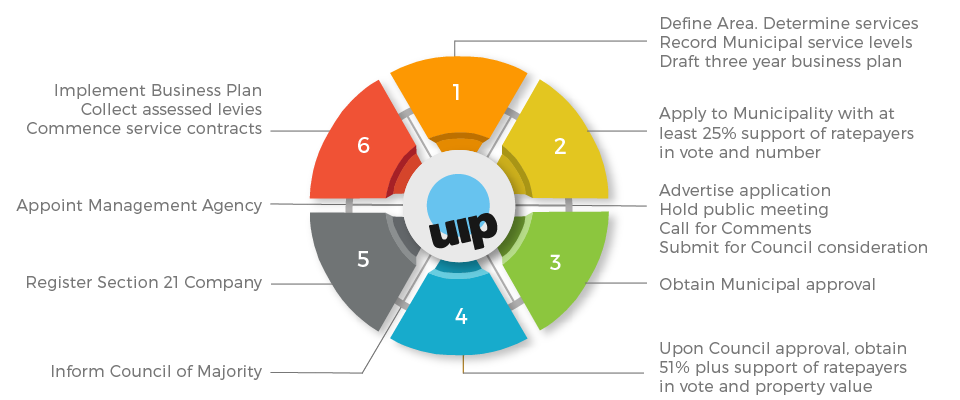
UIP Overview
Firstly, the geographic extent and boundaries of the Precinct have to be established. All property owners and major tenants within the defined area must be identified and shown the proposed intervention. A referendum has to be held and a pre-determined majority must be achieved in order to legally establish a Precinct. Whilst the application to the local authority to establish a Precinct may be made by 25% of property owners, final approval will not be considered unless more than 50% of relevant property owners are in agreement, representing 51% or more of the total property valuation of the area.
Once a Precinct is authorized, 100% of property owners within the area must contribute financially. The Precinct is constituted as a Section 21 Company with a Board of Directors elected among the contributors. It comprises property owners, business owners, representatives of residents’ organisations and representatives of the local authority. According to the legislation, the majority of directors are required to be property owners. The Board appoints a specialized urban management company to manage the day-to-day operations within the precinct and effectively control the precinct within the terms of the UIP business plan, which may be established over a period of two to five years.
Through legislation, the cost of provision of UIP services is spread over an equitable, pre-agreed basis among all property owners within the geographical area. The levy is based on the calculations of rateable property values and costs are borne in proportion to the value of the property. The local authority must inform the UIP of its current level of service and must maintain the same level of service when the UIP is running through a services level agreement (SLA). This is to ensure that the UIP services remain supplementary and are not a replacement for local authority baseline services. The UIP is established for an initial period of three years but its life can continue indefinitely unless members move for material changes to the original business plan. Members may vote for the dissolution of the UIP at any time during its lifetime on a similar referendum as is initially used to support its establishment.
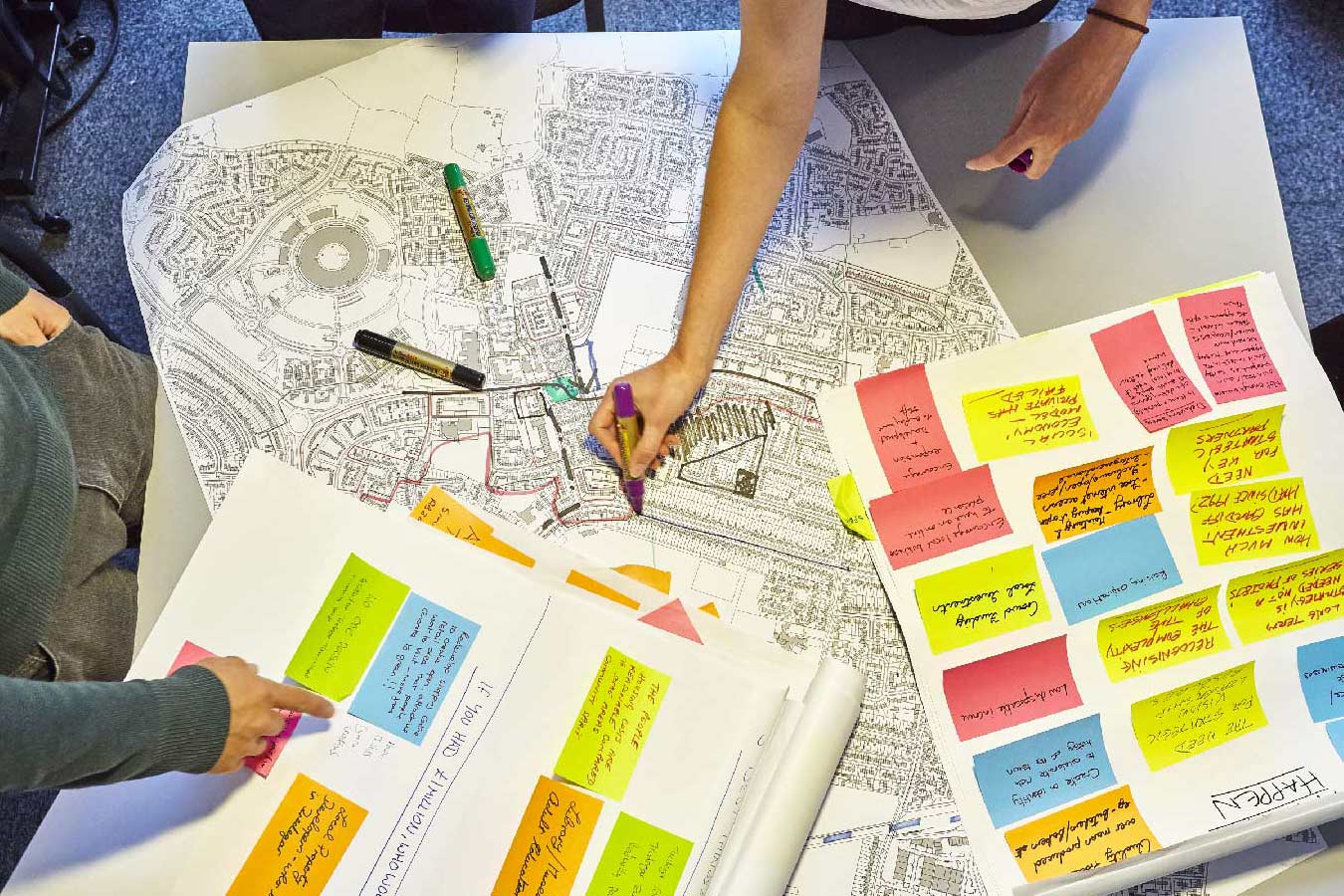
Special Rating Areas

As of July 2008, Precincts became known as Special Rating Areas (SRAs) and Service Agreements (section 67 of MFMA) were put in place by the eThekwini Municipality, which together with the Rates Policy sets out specific rules and regulations pertaining to the management of these areas.
The Urban Improvements Precincts is a Section 21 Company, not for profit, with the mandate to establish Special Rating Areas (SRAs) or Precincts. Since early 2000 the UIP Company established three Council approved precincts in the inner city in response to the needs of property owners who wanted to improve, at their cost, the environment in which they lived and worked.
UIP Integrated Service Delivery
Although the existing services provided by the Ethekwini Municipality, Metro Police, South African Police Services (SAPS) and Durban Solid Waste (DSW) are invaluable, property owners identified visible gaps in service delivery in the Urban Management realm that required consistent additional and dedicated attention. This could only be achieved by a specialist team working closely with all concerned stakeholders including property owners, the Municipality, and other partners.
The function of the UIP is not just a top-up service of cleaners and on the ground security monitoring and surveillance, but involves daily interaction and joint operations with law enforcement agencies such as Metro Police, as well as close cooperation and with the other municipal line departments such as DSW, Roads and Storm Water, Electrical, Parks, Ethekwini Traffic Authority, iTrump, Safer Cities, Disaster Management and other role-players to ensure that the many issues and varying challenges are competently and rapidly resolved.
The UIP Company is proactive and vigorously lobbies support for issues of common concern to all ratepayers and, with its vast networking base, helps to fast track service delivery that would ordinarily be delayed by red tape and city protocol.
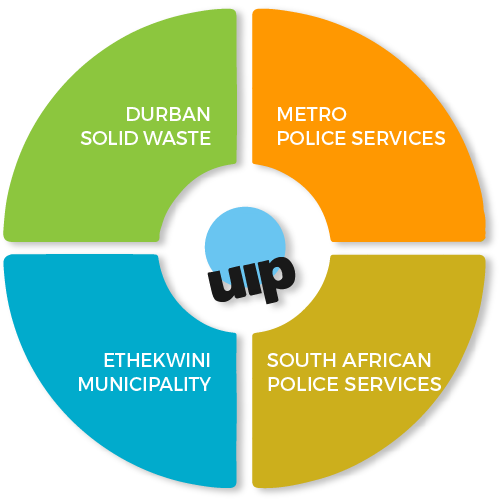
UIP Company Precincts
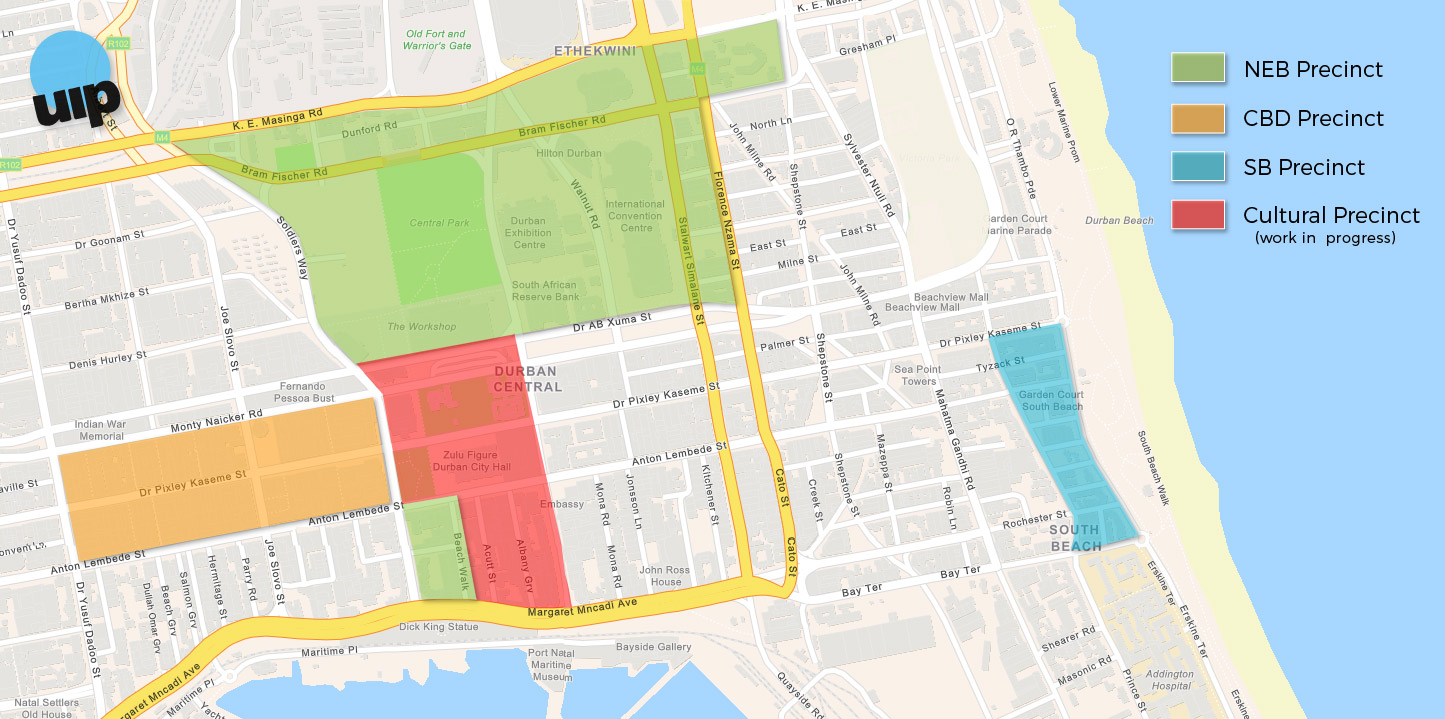
Central Business District Precinct
The Central Business District Precinct was the first official UIP established in Durban in July 2000. Located in the heart of Durban’s Central Business District, it is bordered by Anton Lembede, Dr Yusuf Dadoo, Monty Naicker and Dorothy Nyembe Streets.
The CBD Precinct has over 100 members that include Delta Properties, Foschini Group, ABSA Bank, Redefine Properties, SA Mutual Life Assurance, Shoprite, Edgars, Hub, Game and Woolworths. The 2020/21 annual budget for the CBD Precinct is R7.6M
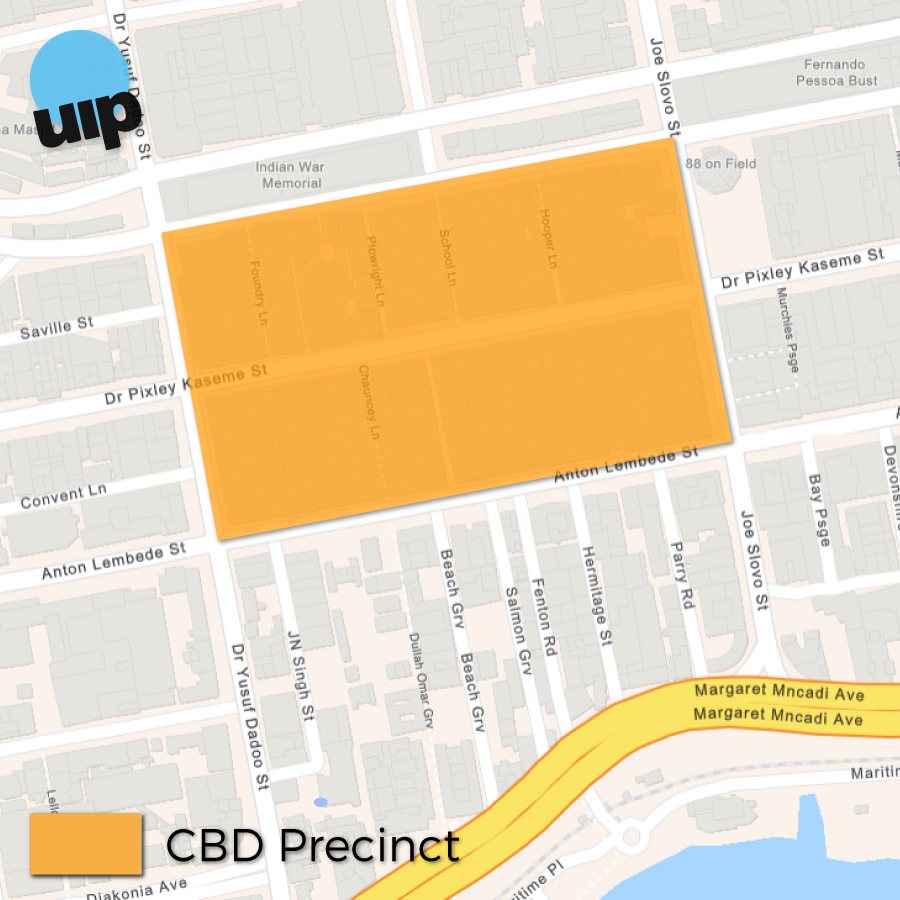
North East Business Precinct
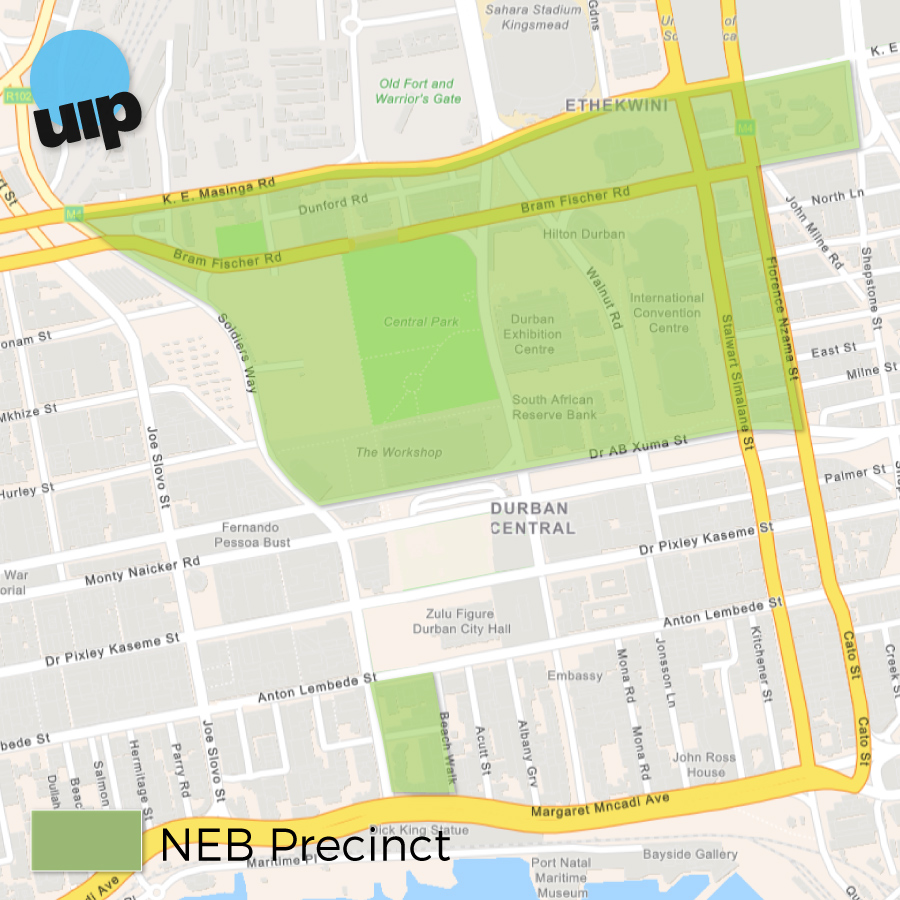
The Northeast Business District Precinct was the second official UIP established in Durban in July 2001. The Northeast Business District Precinct comprises two areas adjacent to the CBD, one bordered by Soldiers Way, Dr AB Xuma, Florence Nzama and Braam Fischer Roads and the other, bordered by Dorothy Nyembe Street, Margaret Mncadi Avenue, Beach Walk and Anton Lembede Street.
The NEBD Precinct has over 200 members that include City Lodge, Reserve Bank, Albert Luthuli Exhibition Centre, Hilton Hotel, Workshop, Marine and Royal Hotel. The 2020/21 annual budget for the NEBD Precinct is R1.2M
South Beach Precinct
The South Beach Precinct was the third official UIP established in Durban in July 2002. The South Beach Precinct is located in Durban’s popular South Beach Area and is bordered by Rutherford, Gillespie, and Dr Pixley KaSema Streets and the O.R. Tambo Parade.
With over 1400 members the SB Precinct has a mix of residential, commercial, hotel and time share properties that include South Beach Garden Court, Tropicana, Durban Spa and 10 South. The 2020/21 budget for the SB Precinct is R4.1M
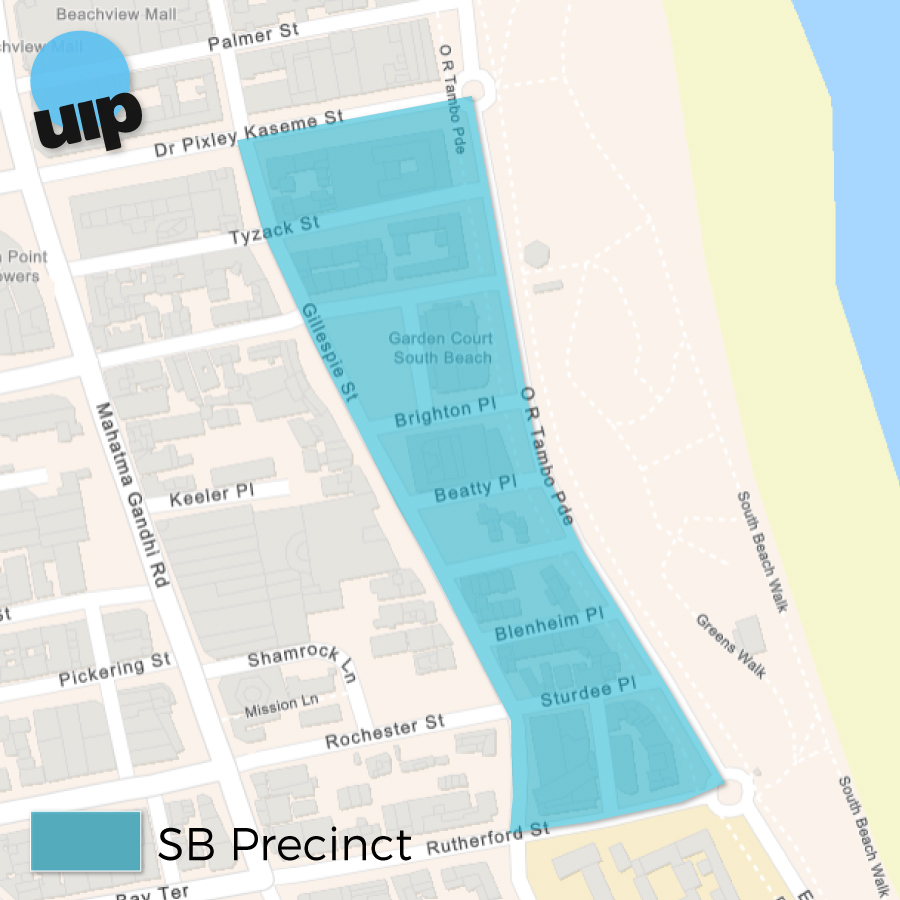
Cultural Precinct
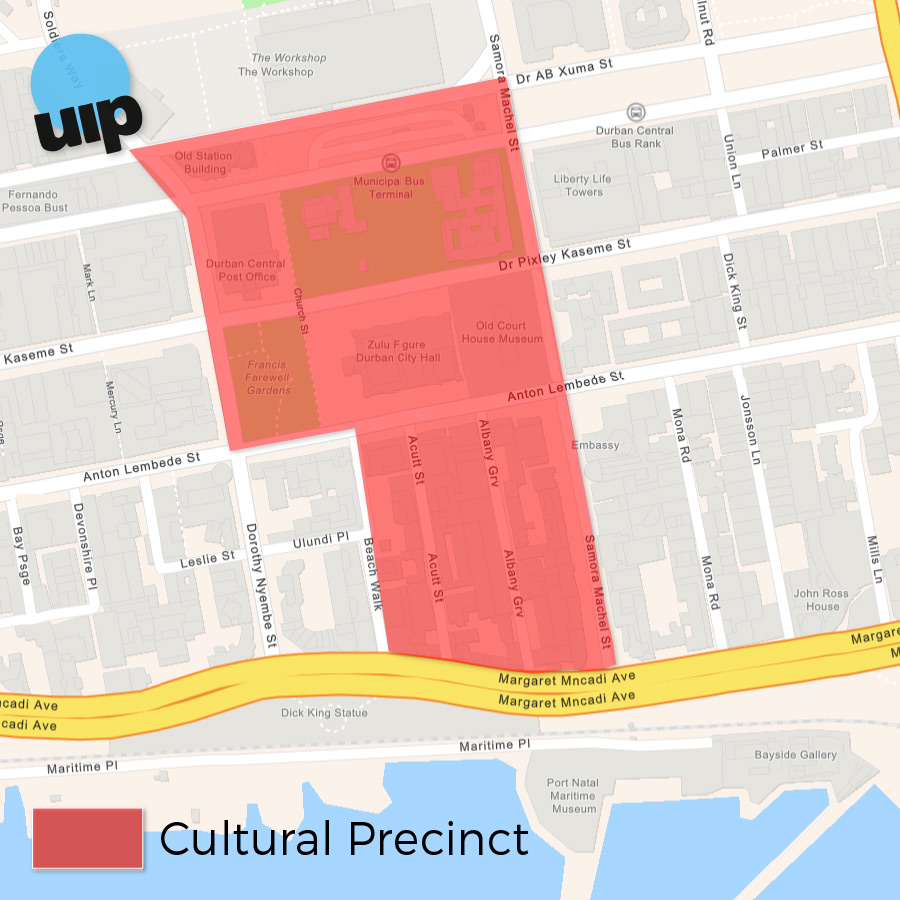
The establishment of the Cultural Precinct was mooted by the city leadership in 2018. After meetings held with key property owners in the area last year, the UIP Company introduced proof-of-concept supplementary services between December 2020 and February 2021. This was done to address the high levels of crime and grime and the increased rate of urban decline in the area. Property owners responded positively to our interim deployment of round-the-clock cleaning and security teams that first halted and then began reversing the downward spiral of urban decline.
This generated much interest among property owners that has since driven the precinct formation process to an advanced stage. The Cultural Precinct is located in the heart of Durban’s Arts and Culture Scene and abuts the UIP Company’s existing Central Business and North East Business District Precincts. Bordered by Dr A.B. Xuma and Dorothy Nyembe Streets, Anton Lembede Street and Beach Walk, Margaret Mncadi Avenue and Samora Machel Street, this culture-rich precinct includes the Maritime Museum and the Bat Centre on the Waterfront.
FAQ's
A Special Rating Area is a specifically defined area which is sanctioned by the municipality and where ratepayers give approval to raise levies to fund additional services to improve the quality of life in that area.
A Memorandum of Agreement (section 67 of the Municipal Finance Management Act 2003) is put in place by the eThekwini Municipality, which together with the Rates Policy sets out specific rules and regulations pertaining to the management of these areas. This is done through a Section 21, not for profit company managed by a Board of Directors, elected by its members and operated by a management team.
There are various steps that need to be taken:
1. It normally starts with a champion in a community wanting to upgrade their environment.
2. The area of the intended SRA must be defined.
3. A budget and proposal which clearly identifies the services to be offered needs to be prepared and presented to the community.
4. For commercial properties a 51% support must be obtained and residential areas need a 66% support.
5. Once completed, the business plan and implementation plan must be submitted to the municipality, together with the ‘signed support for establishment forms’.
6. All documents must then be lodged with the city and a public meeting is advertised and called for by the municipality to review any objections.
7. Once approved, a Board is elected and a Section 21company is set up. All necessary accounts have to be in place before the municipality will invoice the property owners and pay over the levies.
Once the necessary percentage approval has been obtained, 100% of all ratepayers in the SRA contribute by way of a levy to the functioning of the desired SRA.
The ratepayer’s contribution will depend on the market value of his property as a percentage of the total SRA’s market value applied as a percentage to the budget.
The Municipality is not involved with the daily operations of the SRA, but oversees the operation by means of various monthly reporting requirements. A rates factor allows for a differentiation in levies for the different types of properties, such as residential, commercial, or industrial. By 31 December each year, the UIP Company has to enter into a Finance Agreement with Council.
The UIP is funded by you, the ratepayer. If your property falls within an approved UIP precinct, you contribute SRA rates, which are a monthly charge the municipality collects with your rates, water and lights bill, and pays over to the UIP for services rendered.
The Municipality provides the UIP Company with monthly schedules of individual SRA rates contributions which can be measured against anticipated collections. The reason for the arrears is established with the assistance of the Treasury and defaulters are subjected to the municipality’s credit control and debt collection policies. Water and electricity services will however be the first to be affected.
The final decision rests with Council once various procedures have been followed and a public meeting held.
Council invoices and collects the assessed rates on a monthly basis and is obliged to pay over these amounts to the UIP Company the following month.
A budget reflecting the required services and the number of ratepayers making up the potential SRA will determine the cost for each member.
It will depend upon the reasons for wanting to establish a SRA as well as the budget and number of contributors. However:
- With emphasis initially focused on crime and grime the lifestyle of the member will improve.
- As the UIP provides a top up service over and above the existing services provided by the municipality, improvements across the spectrum will be seen.
- Close liaison with the various municipal departments ensures snags and areas of decay are immediately attended to.
- Property values should increase or remain unchanged
By obtaining a 51% majority vote, from all the ratepayers in a SRA, Council can be approached to consider dissolving a Special Rating Area.
These may take a variety of different forms some of which may comprise:
- Increased security in the surrounds.
- Cleaner streets and pavements.
- Ensuring maintenance and improvement of infrastructure.
- Improved lighting, pavements, and roads.
The Urban Improvements Precincts (RF) NPC is a Section 21 Company managed by a board of directors and a general manager. Members are encouraged to get involved by attending UIP meetings, and liaising with the office.
